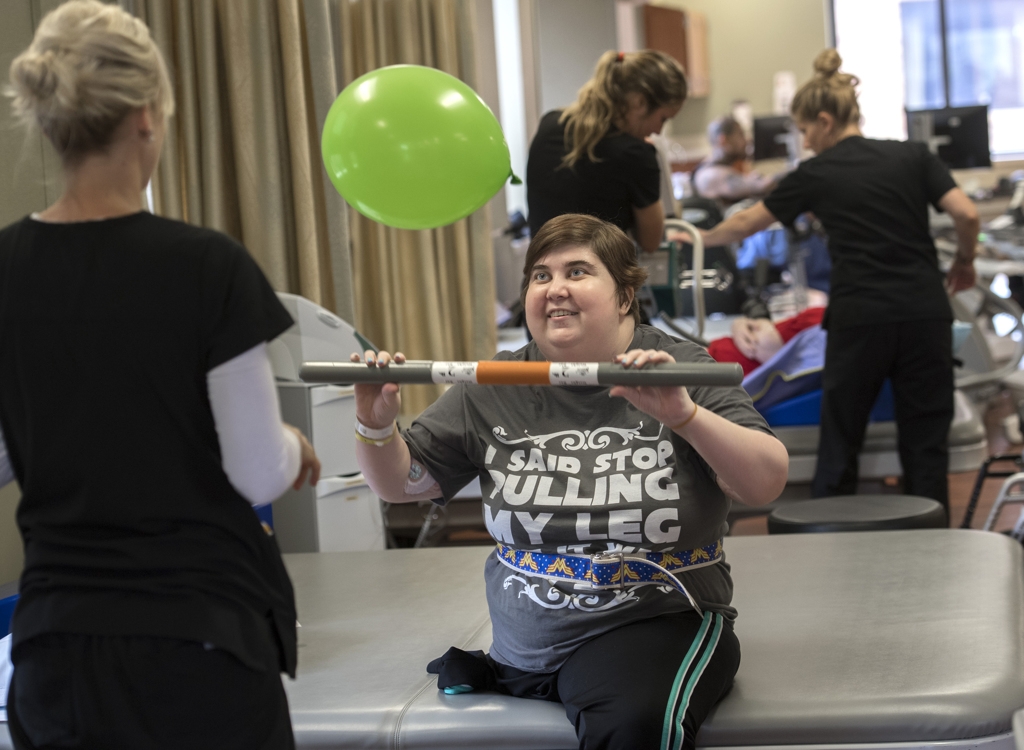Be Supported Always
Common Questions
What to Expect
.jpg)
Length of Stay
An average length of stay on a subacute rehabilitation unit is 21 days; with a range of stay varying from 3 to 90 days depending on your medical and rehabilitation needs.
Amount and Intensity of Therapy
You will receive therapy services 30 minutes to 3 hours per day, five to seven days a week, depending on your diagnosis, ability to tolerate therapy and medical stability. Therapy services may include physical, occupational, speech therapy. Advanced technologies and therapeutic approaches are available within this level of care.
Physician Involvement
Internal medicine physicians and advanced practice providers (physician assistant, nurse practitioner) oversee your plan of care throughout your stay and collaborate closely with your nursing team to manage your medical needs.
Nursing Care
Nursing care is provided 24 hours a day, seven days a week by registered nurses (RN), licensed practicing nurses (LPN) and certified nurse aides (CNA).
Admission Criteria
- Need for daily therapy and/or daily skilled nursing care
- Need continued care for a condition you were treated or during your hospital stay
What to Bring
What should I/my family member bring the day of admission?
Admission intake and paperwork are completed in the first hours after your arrival. Family or support persons are invited and encouraged to attend. If there is a guardian or durable power of attorney in place, please provide a copy of that paperwork.
What kinds of clothes should I bring?
We recommend that you bring comfortable clothing that is easy to get on and off. Examples might include soft, pull-on pants or gym shorts, easy-to-don shirts, and shoes or slippers that have non-slip soles.
Do you provide laundry service?
Clothing can either be washed onsite by our team, or by family members. During the intake process, we will ask your preference.
Understanding the Journey

What does my journey look like?
Our goal is to help you recover safely and quickly so that you can return to the activities you enjoy. The moment you enter our rehabilitation center, we begin planning for your return home. During your stay, please use your provided handbook(s) as a resource for ongoing education and information.
Setting Goals and Achieving Outcomes
Establishing meaningful goals for your rehabilitation is an important step to your recovery and your involvement in this process is key to your success. Your care team will meet with you to discuss your abilities and limitations and will help you set goals that meet your needs and desires.
Ongoing Communication: Understanding the Plan
You, the patient, are the center of the treatment plan; therefore it is important that you and your support system feel well informed about the care you are receiving, your diagnosis and your progress toward discharge. Open communication between you and the care team in achieved through your daily interactions with the care team members and schedule patient conferences, as needed. Our goal is to ensure all questions about your care, education you have received and recommendations for discharge are answered so that you feel equipped to return home and back to your community.
Rehab and Rest
During your stay, you will participate in at least three hours of therapy per day, five days per week, which requires tremendous effort. Because optimal healing and recovery also requires rest, you should plan to dedicate one full day of rest during each week of your stay. You should also participate in one day of activity other than rehab. This healthy balance of rehabilitation and rest will help you recover in a safe and timely manner.
Caregiver Training: New Information
A caregiver is someone you know and trust to help you manage your care needs after you leave inpatient rehabilitation. Your caregiver may be a family member, friend or neighbor. If no one is available or you need care beyond the ability of friends and family, Spectrum Health At Home may be able to help. Caregivers are encouraged to participate in education and training throughout your stay. Depending on your needs, your team may schedule a time to train your caregiver to ensure a safe transition.
Education
It is important for you to learn about your condition and the role that rehabilitation plays in your recovery. You can anticipate daily education throughout your rehab stay, as well as focused education on how to manage your condition and medications.
Safe Transitions: The Next Step in Your Journey
As you prepare to leave the inpatient rehabilitation setting, the care team will help you practice important transitional skills such as getting in and out of a car or managing your own medications. Spectrum Health inpatient rehab programs have a kitchen and living space designed to practice skills to be safe in your next environment. A home evaluation may need to be conducted to assess safety and mobility within your home environment. If a home evaluation is needed, your care team will schedule a visit to your home and help make necessary preparations and adjustments to properly prepare you and your family for a safe transition home.
